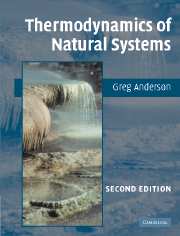Book contents
- Frontmatter
- Contents
- Preface
- 1 What is thermodynamics?
- 2 Defining our terms
- 3 The first law of thermodynamics
- 4 The second law of thermodynamics
- 5 Getting data
- 6 Some simple applications
- 7 Ideal solutions
- 8 Fugacity and activity
- 9 The equilibrium constant
- 10 Real solutions
- 11 The phase rule
- 12 Redox reactions
- 13 Equations of state
- 14 Solid solutions
- 15 Electrolyte solutions
- 16 Rock–water systems
- 17 Phase diagrams
- 18 Process modeling
- Appendices
- References
- Index
7 - Ideal solutions
- Frontmatter
- Contents
- Preface
- 1 What is thermodynamics?
- 2 Defining our terms
- 3 The first law of thermodynamics
- 4 The second law of thermodynamics
- 5 Getting data
- 6 Some simple applications
- 7 Ideal solutions
- 8 Fugacity and activity
- 9 The equilibrium constant
- 10 Real solutions
- 11 The phase rule
- 12 Redox reactions
- 13 Equations of state
- 14 Solid solutions
- 15 Electrolyte solutions
- 16 Rock–water systems
- 17 Phase diagrams
- 18 Process modeling
- Appendices
- References
- Index
Summary
Introduction
If the world were made of pure substances, our development of the thermodynamic model would now be complete. We have developed a method, based on measurements of heat flow, that enables predictions to be made about which way reactions will go in given circumstances. But one of the reasons that the world is so complex is that pure substances are relatively rare, and strictly speaking they are nonexistent (even “pure” substances contain impurities in trace quantities). Most natural substances are composed of several components, and the result is called a solution. Therefore, we need to develop a way to deal with components in solution in the same way that we can now deal with pure substances – we have to be able to get numerical values for the Gibbs energies, enthalpies, and entropies of components in solutions. We will then be able to predict the outcome of reactions that take place entirely in solution, such as the ionization of acids and bases, and reactions that involve solids and gases as well as dissolved components, such as whether minerals will dissolve or precipitate. Our thermodynamic model will then be complete.
In this chapter we have a look at how to deal with dissolved substances – solutes. When we mix two substances together, sometimes they dissolve into one another, like sugar into coffee or alcohol into water, and sometimes they do not, like oil and water.
- Type
- Chapter
- Information
- Thermodynamics of Natural Systems , pp. 176 - 197Publisher: Cambridge University PressPrint publication year: 2005



